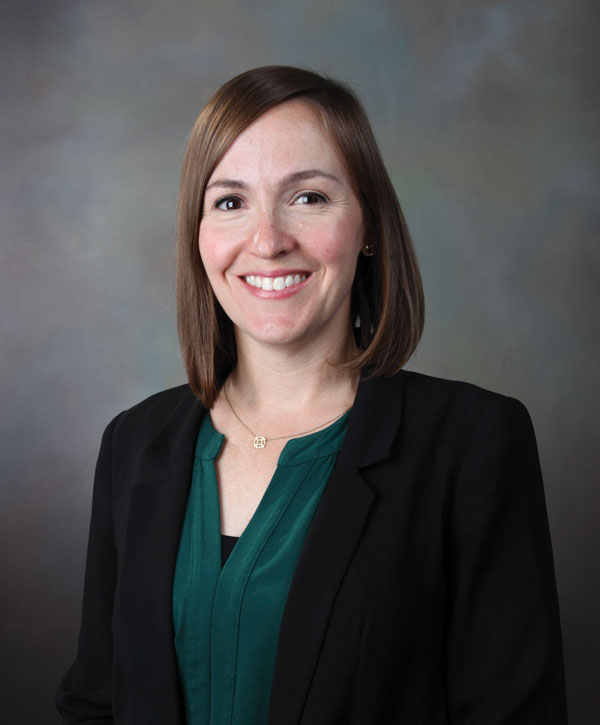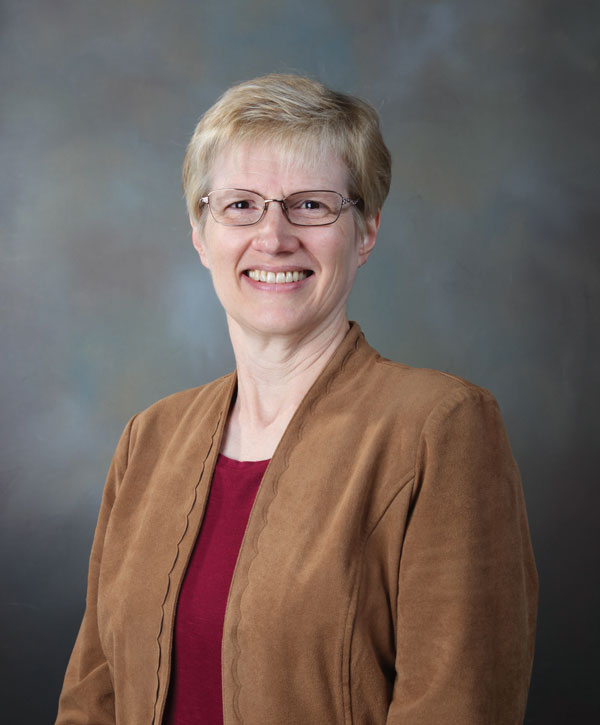Sandia scientists Blythe Clark and Karen Devine were honored at the 2019 Society of Women Engineers awards ceremony in Anaheim, California. The annual event recognizes “the successes of individuals who enhance the engineering profession and advocate for women in engineering through contributions to industry, education and the community.”
Blythe G. Clark

Sandia manager Blythe G. Clark earned a 2019 SWE Advocating Women in Engineering Award at the November ceremony. Blythe joined Sandia in 2008 and has led the materials characterization and performance organization for the past four years. She has spent her research career leveraging her expertise in advanced electron-microscopy-based analyses to identify and predict atomic-scale processes critical to advancing the fields of nanomechanics and nanostructured metals.
Blythe’s work on thermally and mechanically stable platinum-gold nanocrystalline coatings has been a game changer, with her team realizing leading-edge, ultra-wear-resistant electrical contacts. “We believed that thermally stable binary nanocrystalline alloys could have remarkable mechanical properties,” she said.
Based on initial collaborator predictions, Blythe selected a platinum-gold alloy as a material that could work. However, after additional calculations, concerns were raised that the material may be “nothing special.” After careful consideration, Blythe decided to proceed.
“It could have been a failure, but I took the risk, and it was amazing to see it pay off,” she said. “It was exciting to see how cool that material is.” Sandia scientist Nicolas Argibay continued the work to engineer a platinum-gold alloy that may be the most wear-resistant metal in the world.
Blythe’s devotion to her work at Sandia is equaled by her enthusiasm in advocating for inclusion and diversity. As a staff member, Blythe joined a peer mentoring group. Her group read Anne-Marie Slaughter’s article, “Why women still can’t have it all,” which sparked a deep interest for Blythe in unconscious gender bias, leading her to read extensively on the topic and to work to identify solutions to increase workplace inclusion and diversity.
Through the Sandia Women’s Action Network, which she co-chaired from 2017 to 2019, Blythe led efforts to influence policy changes and obtain strategic commitments from Sandia leadership to mitigate bias in recruiting, hiring, development and retention.
Recently, Blythe co-authored an article with Olivia Underwood, “Mitigating implicit bias as a leader,” for the Minerals, Metals & Materials Society. In the article, Blythe and Olivia point out that “the overwhelming evidence shows that we need diverse teams with diverse thoughts: diversity of thought that comes not only from different education backgrounds, but from different upbringings, different ethnicities, different genders and different life experiences.” The article identifies several ways for leaders to increase inclusion and leverage diversity.
“When I think about the charge of science and engineering — being able to create the future and solve problems that haven’t even been conceived yet — our job is to solve the most difficult problems in the world with the most creative and innovative approaches possible,” she said. “The only way I know to get there is to leverage diversity of thought on teams and make that into something special. When you bounce ideas off each other and get broad input is often when the magic happens.”
Karen Devine

Sandia researcher Karen Devine earned a 2019 SWE Prism Award at the annual event. Karen began her Sandia career as a summer graduate intern and then joined Sandia in 1994, becoming a full-time employee in 1996. She wears many hats inside and outside Sandia, including computer science researcher, project lead, customer liaison, mentor, mother and STEM outreach advocate.
In 2001, Karen pioneered a process for releasing open-source software. The release of open-source software enables free exchange of ideas, promotes reproducible results and reduces duplication of effort in the research community.
“One of the things we did early was to work with the tech transfer people and the export control people to create a way to release software,” she said. Prior to her work, few projects released open-source software. Now the DOE Office of Science requires open-source software release for many new proposals.
The first test case for Sandia’s open-source release process was Zoltan, a production tool for engineering and a research test-bed for new algorithms that improve parallel performance. Karen designed and has supported Zoltan for more than 15 years. The software has been downloaded more than 4,500 times since its release. Currently, Karen is investigating ways to leverage DOE investments in high-performance computing to speed development and reduce the cost of solutions for extreme-scale data analytics.
When interviewing candidates, Karen emphasizes the importance of Sandia’s work. “People really use what we write, and what we write is really important,” she said. “We can’t compete with employers offering ping pong tables and free food, but what I do feels more important. I think that’s where Sandia really has an advantage.”
Karen is active in the research community through her leadership in technical program committees, conferences and professional societies. In addition to mentoring junior staff members, she has mentored 17 students and postdoctoral students.
Karen also promotes math fluency as a volunteer for Sandia’s Family Math Night program, and has organized events (aligned with the Association of Women in Mathematics’ annual essay contest) that connect middle school girls with Sandia women in STEM. At one event, the girls’ teacher commented on the positive impact of seeing a whole room of women in STEM, rather than just one or two.
Karen hopes to leverage her Prism Award to increase hiring and STEM opportunities. “I hope I can raise a little visibility for Sandia,” she said.